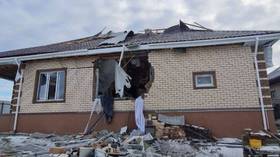No US-Iran peace till there is democracy in Tehran, says ex-diplomat McFaul, who’s ‘surprised’ by negative feedback
Stanford Professor Michael McFaul was surprised by the number of negative comments he received after stating that there can be no good relations between Washington and Tehran until Iran “becomes a democracy”.
The observation, which the Obama-era diplomat shared with his Twitter followers on Friday, provoked an avalanche of critical responses. McFaul later even said he was surprised that his “analytical statement” that simply rehashed a theory that democracies generally get on together well was taken as a policy suggestion to Tehran.
U.S.-Iran relations will never be stable and peaceful until Iran becomes a democracy.
— Michael McFaul (@McFaul) December 11, 2020
It is a scientific hypothesis that democracies get along better with each other than democracies and dictatorships. Nothing to do with norms
— Michael McFaul (@McFaul) December 12, 2020
Expressed shortly in a claim that “democracies don’t go to war with each other”, the theory has many proponents, but is also subject to many criticisms. Definitions of “democracy” and “war” as well as causality between a political system and a peaceful foreign policy are all debatable.
The remark from the former US ambassador to Russia and now a prolific tweeter was picked apart on many levels. McFaul was reminded that, for starters, it was the US who actively stifled a budding democracy in Iran by supporting a coup against elected Prime Minister Mohammad Mosaddegh in 1953,turning the country back into a dictatorial monarchy. The 1979 Islamic Revolution, which brought the current government in Tehran into being, was blowback for that adventure.
hey quick question, which was the country that ended iranian democracy in 1953 and installed a western-friendly dictator in order to secure oil rights for itself?
— Opinion Haver (@AsInMarx) December 11, 2020
There are also plenty of US allies that stand much further away from having a democratic system than Iran does. McFaul believes that in the long run US relations with countries like Saudi Arabia would deteriorate. He even cited the 2018 assassination of Washington Post columnist Jamal Khashoggi by Riyadh’s agents as an example of how US-Saudi relations are supposedly on a rocky ground.
Strong as a rock? You gotta be kidding me. #Khashoggi . Prediction: USA-KSA relations will face a very rocky road in coming decades, ESPECIALLY if Iran made a transition to democracy. Power matters. Regimes matter too. https://t.co/iwi22ALcLq
— Michael McFaul (@McFaul) December 12, 2020
The murder didn’t seem to have affected Saudi Arabia’s ability to rely on America and its allies for military assistance or other kinds of help though.
The notion that democracies don’t fight was endorsed by both Republicans and Democrats in the US. And it never prevented the country from being a global hawk and an interventionist, targeting nations opposing Washington regardless of how they chose their leaders. If anything, one can argue that “promoting democracy” has long been a useful pretext for defending US imperial interests.
If I remember correctly, we’re the ones who destroyed that. Often when the US says we want democracy, what we’ve really meant is that we want democracies where people who we like are the ones who are democratically elected. Iran, Chile, etc.
— Marianne Williamson (@marwilliamson) December 12, 2020
America’s own brand of democracy is also in question. McFaul easily got behind the notion that now was hardly the best time to lecture anyone on how to conduct elections — an apparent jab at Donald Trump and his refusal to concede to Joe Biden.
On this, we agree. Maybe not the "worst" in the world, but we have no credibility abroad supporting democracy if we cannot improve our democracy at home. & that project isn't going well right now. https://t.co/7wQvhzjEhC
— Michael McFaul (@McFaul) December 11, 2020
But just like aggressive interventionism, support for big corporations and political donors at the expense of working-class Americans has been a bipartisan policy for decades, regardless of who occupied the White House. Biden, for example, didn’t win the moniker“senator from MBNA” by defending the little guy from credit card predators.
This assumes the US is a democracy. Is it? pic.twitter.com/dTOwJbPCzH
— Michael Tawiah3 (@MichaelTawiah31) December 11, 2020
Needless to say, the idea that US-Iranian relations could be normalized if the US stopped imposing its will on the Middle East, is not popular in Washington. McFaul, for instance, believes that US interests come first, and that diplomacy is not at all about improving relations.
US-#Iran relations will never be stable & peaceful until the US quits trying to dominate the region.Democracy is not the issue. We have stable & peaceful relationships w/some of the world’s most retrograde dictatorships—in fact we arm & sustain them.Stop internalizing empire.
— Pouya Alimagham پويا عالي مقام (@iPouya) December 11, 2020
I also believe that “improved relations” should never be the objective of US diplomacy, but a means to more concrete US security, economic, and normative goals. https://t.co/37brNffIsG
— Michael McFaul (@McFaul) December 12, 2020
If you like this story, share it with a friend!














